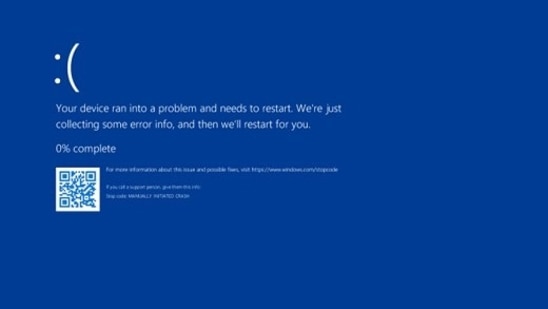Globally, banks, airlines, TV networks, and healthcare institutions that depend on Microsoft 365 software reported extensive disruptions on Friday. Numerous public and retail services were disrupted globally, and thousands of flights and rail services were canceled in the United States and Europe.
What is known regarding the outages is as follows:
What led to Microsoft's worldwide outages?

Global cybersecurity company CrowdStrike claimed it had discovered a technical flaw with their software and was trying to fix it, which was the root of the problem. Microsoft uses CrowdStrike's antiviral software on its Windows devices.
"While the root cause has been identified and addressed, certain Microsoft 365 applications and services are still being impacted by it. In an announcement posted on social media, Microsoft stated, "We're undertaking extra mitigations to offer relief."
A pre-recorded message indicated that CrowdStrike was aware of complaints of breakdowns on Microsoft systems connected to its Falcon Sensor software when CBS News phoned the company's technical help line on Friday.
CrowdStrike CEO George Kurtz claimed that a remedy was being developed and that the problem had been found in a statement released on Friday with CBS News and social media.
"CrowdStrike is now assisting clients who have been affected by a flaw discovered in a single Windows host content update. There is no impact on Mac or Linux hosts, according to Kurtz. "This isn't a cyberattack or security incident. A solution has been implemented when the problem was located and isolated."
What has been impacted by the outages on Microsoft?
)
By early Friday morning, over 1,000 flights had been canceled and over 1,700 more had been delayed in the United States. Over 15,000 planes were delayed early on Friday throughout the globe, and more were predicted to follow.
All scheduled flight departures on American Airlines, United, Delta, and Spirit Airlines were halted; however, later on Friday morning, at least some flight departures on American Airlines, United, and Delta were restarted.
United Airlines released a statement saying, "We are resuming some flights but expect schedule disruptions to continue throughout Friday."
SAS Airlines, KLM, and Lufthansa all experienced problems across Europe. According to BBC News, a CBS News partner network, aircraft were not being permitted to land at Switzerland's main airport, Zurich.
Everything was done by hand at Delhi, the nation's main airport in India. According to the BBC, gate information was being manually updated on a white board and there were no working electric check-in terminals.
Physicians in the United Kingdom reported they were experiencing problems logging into their online booking system, while hospitals in Germany announced they were canceling elective surgery on Friday. In the United Kingdom, pharmacists reported problems receiving prescriptions and receiving medication delivery.
Both the BBC's kid-focused TV network and Sky News in Britain ceased operations on Friday. However, when Sky News resumed, its presenters were reading from paper notes instead of teleprompters as they usually did.
The London Stock Exchange reported that although trade had not been affected, there had been disturbances to its regulatory news service.
When will Microsoft's disruptions be resolved?

David Seymour, the acting prime minister of New Zealand, stated on social media that authorities were putting a lot of effort into figuring out the effects of the extensive disruptions.
"I have not currently received any reporting to indicate these issues are related to malicious cyber security activity," Seymour stated.
According to a representative for Germany's interior ministry, there was no proof that a hack was the cause of the disruptions, as reported by Reuters.
But even with CrowdStrike's solution, Omer Grossman, chief information officer of identity security company CyberArk, told Reuters that it will probably take some time to resolve some of the issues raised. He said that this is because of issues with Endpoint Detection and Response (EDR) software that is installed on individual customer PCs.
It appears that the endpoints cannot be updated remotely due to their crash (the Blue Screen of Death), and each endpoint must be manually fixed. Days are anticipated for this procedure, according to Grossman.
Globally, banks, airlines, TV networks, and healthcare institutions that depend on Microsoft 365 software reported extensive disruptions on Friday. Numerous public and retail services were disrupted globally, and thousands of flights and rail services were canceled in the United States and Europe.
What is known regarding the outages is as follows:
What led to Microsoft's worldwide outages?
Global cybersecurity company CrowdStrike claimed it had discovered a technical flaw with their software and was trying to fix it, which was the root of the problem. Microsoft uses CrowdStrike's antiviral software on its Windows devices.
"While the root cause has been identified and addressed, certain Microsoft 365 applications and services are still being impacted by it. In an announcement posted on social media, Microsoft stated, "We're undertaking extra mitigations to offer relief."
A pre-recorded message indicated that CrowdStrike was aware of complaints of breakdowns on Microsoft systems connected to its Falcon Sensor software when CBS News phoned the company's technical help line on Friday.
CrowdStrike CEO George Kurtz claimed that a remedy was being developed and that the problem had been found in a statement released on Friday with CBS News and social media.
"CrowdStrike is now assisting clients who have been affected by a flaw discovered in a single Windows host content update. There is no impact on Mac or Linux hosts, according to Kurtz. "This isn't a cyberattack or security incident. A solution has been implemented when the problem was located and isolated."
What has been impacted by the outages on Microsoft?
By early Friday morning, over 1,000 flights had been canceled and over 1,700 more had been delayed in the United States. Over 15,000 planes were delayed early on Friday throughout the globe, and more were predicted to follow.
All scheduled flight departures on American Airlines, United, Delta, and Spirit Airlines were halted; however, later on Friday morning, at least some flight departures on American Airlines, United, and Delta were restarted.
United Airlines released a statement saying, "We are resuming some flights but expect schedule disruptions to continue throughout Friday."
SAS Airlines, KLM, and Lufthansa all experienced problems across Europe. According to BBC News, a CBS News partner network, aircraft were not being permitted to land at Switzerland's main airport, Zurich.
Everything was done by hand at Delhi, the nation's main airport in India. According to the BBC, gate information was being manually updated on a white board and there were no working electric check-in terminals.
Physicians in the United Kingdom reported they were experiencing problems logging into their online booking system, while hospitals in Germany announced they were canceling elective surgery on Friday. In the United Kingdom, pharmacists reported problems receiving prescriptions and receiving medication delivery.
Both the BBC's kid-focused TV network and Sky News in Britain ceased operations on Friday. However, when Sky News resumed, its presenters were reading from paper notes instead of teleprompters as they usually did.
The London Stock Exchange reported that although trade had not been affected, there had been disturbances to its regulatory news service.
When will Microsoft's disruptions be resolved?
David Seymour, the acting prime minister of New Zealand, stated on social media that authorities were putting a lot of effort into figuring out the effects of the extensive disruptions.
"I have not currently received any reporting to indicate these issues are related to malicious cyber security activity," Seymour stated.
According to a representative for Germany's interior ministry, there was no proof that a hack was the cause of the disruptions, as reported by Reuters.
But even with CrowdStrike's solution, Omer Grossman, chief information officer of identity security company CyberArk, told Reuters that it will probably take some time to resolve some of the issues raised. He said that this is because of issues with Endpoint Detection and Response (EDR) software that is installed on individual customer PCs.
It appears that the endpoints cannot be updated remotely due to their crash (the Blue Screen of Death), and each endpoint must be manually fixed. Days are anticipated for this procedure, according to Grossman.